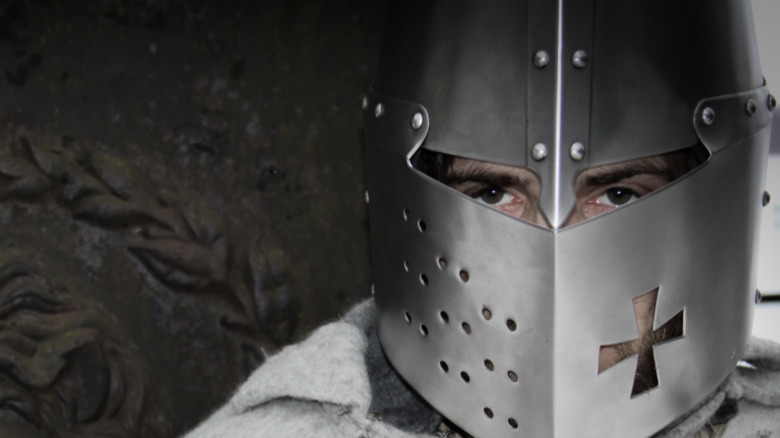How The Knights Templar Got Their Name
The Knights Templar is one of those enigmatic, influential historical groups everybody has heard of, yet few quite understand. A powerful band of warriors and scholars, popular culture has gained something of an understanding of the Templar knights through books, movies, and other media.
Dan Brown's 2003 novel "The Da Vinci Code" (and the 2006 movie) brought the Templar name to the world's attention again, but it was far from an historically watertight and factual account of things (nor was it intended to be, of course). Let's take a look at the true origins of the Knights Templar, their purpose, and the meaning of their name itself.
The order, as History UK reports, was born during one of the most turbulent times in world history: the Crusades. In 1099, Christian warriors of the First Crusade wrested control of Jerusalem from its Muslim occupants. The Siege of Jerusalem, which took place in July of that year (per Britannica), ended in a grisly slaughter of the occupants of the city, marking the beginning of centuries of ghastly bloodshed.
Knighthood, but also monasticism
The Knights Templar were formed in 1119 by Hugues de Payens, says History UK, with the goal of protecting European pilgrims who traveled to Jerusalem from attacks by embittered opposing warriors. There were just nine knights at first, but the order rapidly grew in power and influence. In fact, in 1128, Pope Honorius II officially deemed them an army of God through special papal ruling. Their beginnings, however, remained very humble.
"They initially called themselves the Poor Fellow Soldiers of Christ," History UK reports, "and they swore the vows of monkhood as well as knighthood ... swearing chastity, faith, obedience, discipline and poverty." Though they originally numbered less than a dozen, King Baldwin II rewarded them for their service and faith with a home base: a section of the hallowed Temple of Solomon itself (or the mosque that stood on its site at the time).
In honor of their lofty new digs, the Poor Fellow Soldiers of Christ underwent a name change, to "the Poor Knights of Christ and the Temple," or the even longer "The Poor Knights of Christ and of the Temple of Solomon." This being a bit of a mouthful, a shorter, catchier title arose: the Knights Templar.
The knights' fame, wealth and influence grew exponentially, as believers sponsored and-or joined their cause. Though Muslim forces would later recapture Jerusalem and the Templars' importance would fade, they never forgot their humble origins, reflected in their name.

